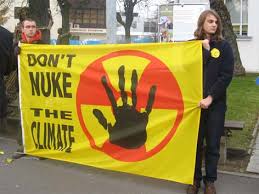Climate change is widely acknowledged as being one of the most pressing issues for the global community affecting many aspects of the environment and society, including, human health, ecosystems, agriculture, water supplies, local and global economies, sea levels and extreme weather events.

However the nuclear industry tries to depict nuclear energy as the most effective way to solve the climate problem.
This claim has no basis in fact, nuclear energy is neither effective or viable. It is not a sustainable source and it causes devastating problems that humanity is not able to handle.
Looking at the whole nuclear energy cycle, nuclear energy does indirectly generate greenhouse gases. Much less than coal and oil, though not a lot less than gas, but significantly more than sustainable renewable energy sources such as solar, wind, hydro and tidal.
Increasing nuclear generation on a large scale would mean exploiting much lower grade uranium ores therefore much more energy from fossil fuels would be needed to mine, enrich and fabricate the uranium fuel, greatly increasing the amounts of greenhouse gases emitted. Using low grade ores to produce the nuclear fuel, will produce similar levels of greenhouse gases as burning gas in the power station in the first place.
Nuclear power only produces electricity. Globally nuclear produces about 16% of the world’s electricity production and this is declining. Even if we switched all fossil fuel generation to nuclear by building hundreds of new nuclear reactors we would not solve the problem. Global electricity production is only one of many human activities producing greenhouse gases, and only produces 9% of global greenhouse gases. The rest of the emissions are produced by transport, heating, agriculture, cement production and deforestation.
Nuclear plants cannot be built in time. To have any significant effect on global warming, global emissions will need to be reduced 50% by 2050. To do this many hundreds of new nuclear reactors will need to be built rapidly, the average reactor construction time for all builds up to 2013, was eight years and many much longer. Worldwide growth in building new nuclear reactors has slowed drastically as investors refuse to buy into the dubious economics of nuclear power.
Nuclear energy is not sustainable nor infinite. Uranium reserves are limited, a rapid expansion of nuclear generation would soon deplete the economically viable stocks of uranium ores being mined. The fuel problem cannot be solved with a closed fuel, fast breeder reactor technology, as despite decades of expensive research, fast breeders have been a technological and economic failure. Plutonium the fuel they would use is extremely poisonous, dangerous and the basis for nuclear weapons.
Nuclear power is not cheap. Costs associated with safety, security, insurance and liability in case of an accident or attack, waste management, construction and decommissioning, are rising substantially for nuclear power. All around the world construction costs have gone considerably over budget, nuclear energy is an expensive diversion from developing and deploying renewable energy sources whose costs are decreasing and can reduce emissions, and be constructed to provide power much more quickly.
There is a growing nuclear waste legacy. All nuclear reactors during nuclear fission produce radioactive waste. The world is struggling to manage the vast mountains of radioactive waste produced over the last half century, no proven solution exists for dealing with this waste, let alone even more from expanding new nuclear. Not one country has a proven method of isolating these wastes from the environment for hundreds of thousands of years they remain a threat.
Nuclear power’s small contribution to power is far outweighed by its inherent dangers. Nuclear reactors provide the ingredients for making nuclear weapons and increase the risk of proliferation. They are also are an obvious target for terrorists. Increasing numbers of nuclear reactors increase the risk of more catastrophic accidents such as Chernobyl and Fukushima, and the radioactive fallout from these accidents travels around the world.
The nuclear industry’s 1950s dream of clean energy too cheap to meter lies in economic and environmental tatters! Nuclear power promotion is a dangerous diversion from the real solutions to climate change – a massive uptake of renewable energy and adoption of energy efficiency measures. The potential for renewable energy is vast, each day the energy that falls on the earth is more than the earth’s global population would use in 27 years. Solar generated power could provide the current world energy 10,000 times over, cleanly!
 PRINT / PDF
PRINT / PDF





































No comments:
Post a Comment